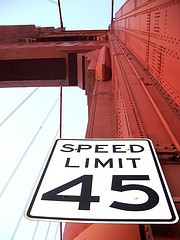 The “basic speed rule” prohibits vehicle operators from driving on a highway at a speed greater than is reasonable and prudent. It also prohibits having disregard for traffic, weather, visibility, the nature of the highway, and other existing conditions. All of these factors are equally important in evaluating whether a driver has met his/her statutory obligations under the “basic speed rule.” Taking all of these factors into account, the Oregon Vehicle Code specifically designates speed limits for their importance in determining whether there is clear evidence of a violation of the “basic speed rule.” It is for this reason that the customary practice of other drivers does not justify speeds higher than those that are posted.
The “basic speed rule” prohibits vehicle operators from driving on a highway at a speed greater than is reasonable and prudent. It also prohibits having disregard for traffic, weather, visibility, the nature of the highway, and other existing conditions. All of these factors are equally important in evaluating whether a driver has met his/her statutory obligations under the “basic speed rule.” Taking all of these factors into account, the Oregon Vehicle Code specifically designates speed limits for their importance in determining whether there is clear evidence of a violation of the “basic speed rule.” It is for this reason that the customary practice of other drivers does not justify speeds higher than those that are posted.
With regard to speeding through a school zone, for example, it was not the intention of the legislature to let each community establish its own policy with respect to the speed limit in a school zone when such determination would be based solely on the driving habit of the motorists in that particular community. Oregon courts have explained why a community-based standard is not legally sufficient. In a leading case on the subject, the court noted: “There are too many circumstances which vary from time to time with regard to what is done in one instance as a measure of what should be done in another instance. Conditions of the street, visibility, the time of day, the number of children, and many other factors determine the kind of vigilance that is required of the motorist.”
Going Too Slow
Speed issues are also addressed in Oregon’s statutory scheme by making it unlawful for a driver to block or impede the normal and reasonable movement of traffic. Such conduct is excused only in rare situations—as when a vehicle may have to stop to allow oncoming traffic to pass before making a turn. This situation would be an example of a speed needed for the safe operation of a vehicle. However, driving slower than is reasonable may lead to a rear end collision.
Going Too Fast and Furious
Speed racing is not allowed on Oregon roads. Therefore, Oregon’s statutory scheme prohibits a driver from participating in certain contests involving a vehicle on the highway. The question as to whether a driver has violated the “basic speed rule” may be a finding of “negligence per se.” The resolution of that issue involves a finding of whether the defendant was acting as a “reasonably prudent person” under the circumstances. So, this issue becomes a jury question. In most cases, the fundamental question to be resolved all boils down to a determination of whether or not the driver acted reasonably—even in light of the violation of the basic speed rule.

